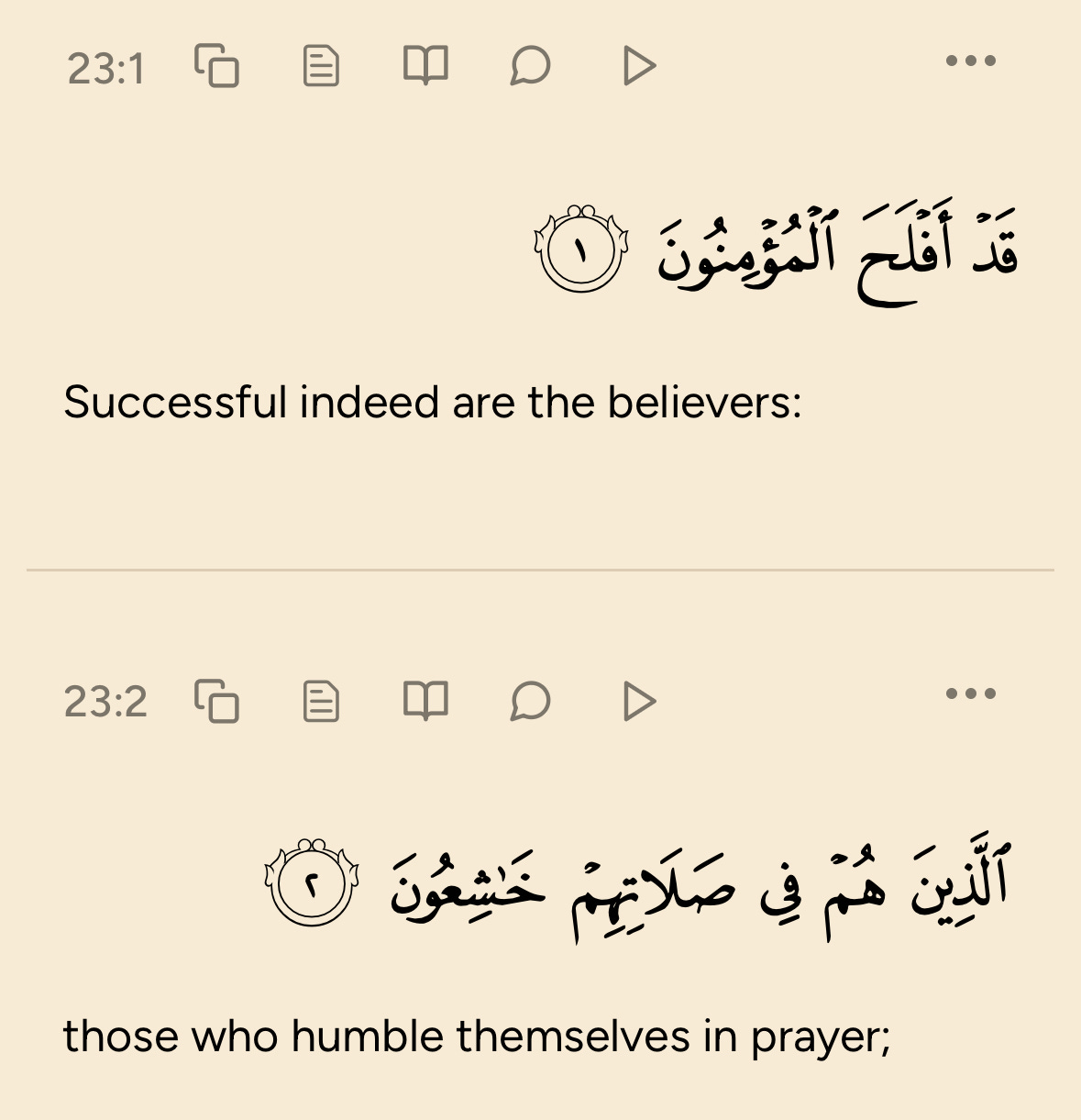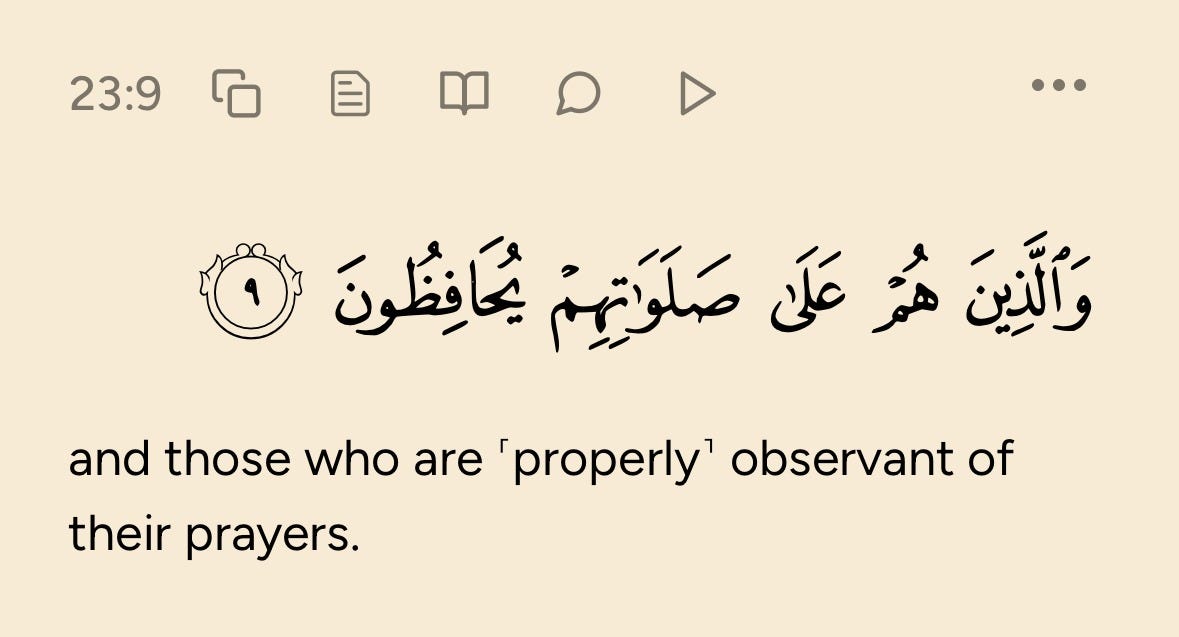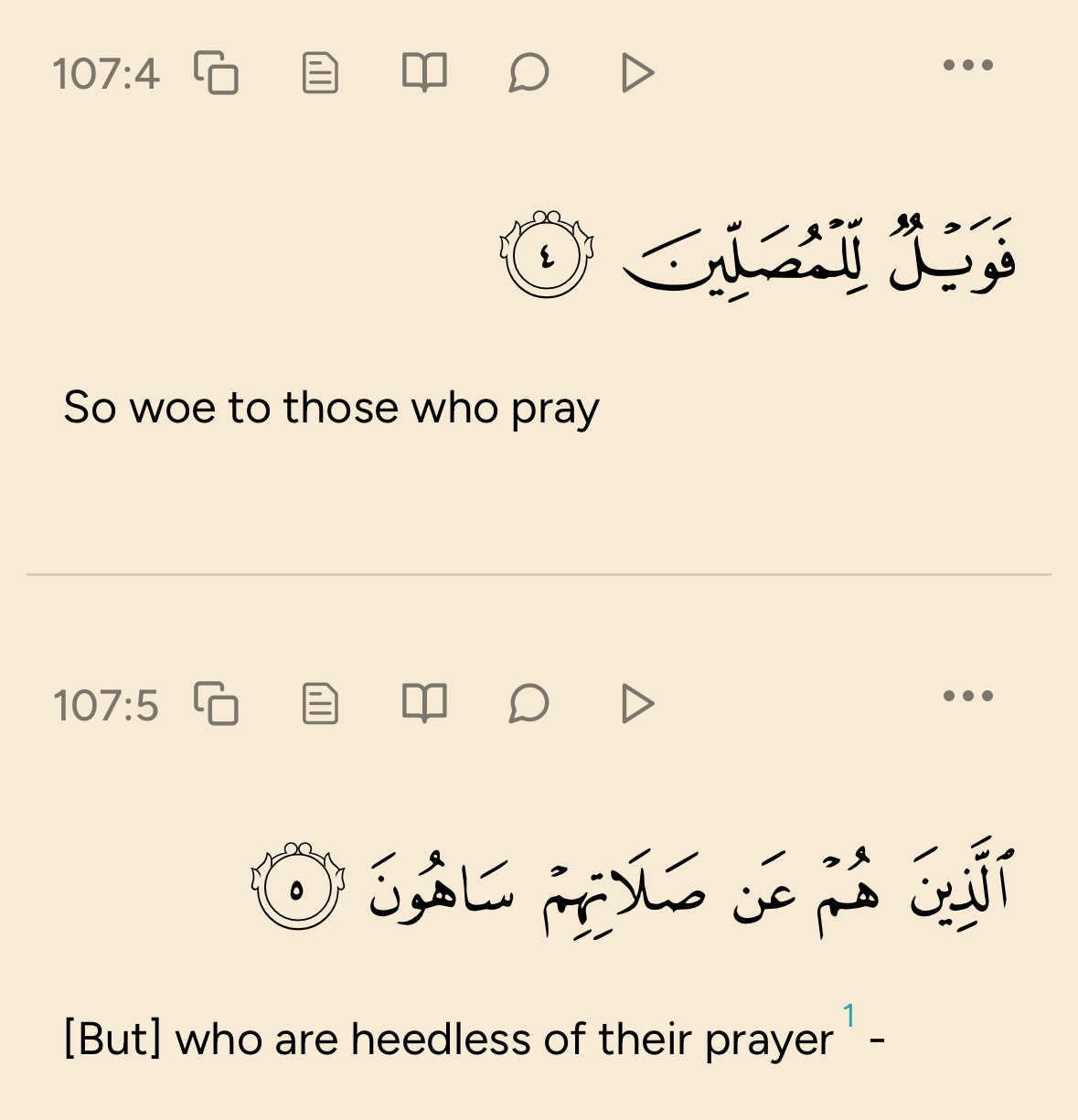Allah will ask you about THIS first…
The importance of prayer – and ways to improve it.
How many times have you planned to “change your life for the better”?
When we look closer in Qur’an and Sunnah, we realize that some things are far more important than others. However, often we focus on improving our worldly life and intend to just squeeze in a few voluntary deeds here and there.
At the same time, we neglect to pause and reassess how we fulfill our obligations.
Meaning, we think about doing more… without rectifying what we’re already doing.
In the last post, I discussed the absolute priorities. Without them, all our efforts are totally worthless and won't be accepted. But what comes after we internalized them and made them our non-negotiable?
There is one specific deed for which Allah will hold you accountable first. If it’s good, you’ll be successful… but if not…
What does Islam teach?
The Messenger of Allah ﷺ said:
إن أول ما يحاسب به العبد يوم القيامة من عمله صلاته فإن صلحت فقد أفلح وأنجح وإن فسدت فقد خاب وخسر
“Indeed, the first deed for which a servant will be held accountable on the Day of Resurrection is his prayer. If it is sound, he will be successful and saved; but if it is corrupt, he will fail and suffer loss.”
[Sunan at-Tirmidhi (413), Sunan an-Nasa’i (465), Sunan Abi Dawud (864)]
Think about what you’ve just read: If our prayer isn’t sound, we will fail and suffer loss in the afterlife.
We will fail – and suffer loss!
The importance of prayer is as clear as the sun. When the Prophet ﷺ sent Muʿadh bin Jabal to Yemen, he instructed him:
فإذا جئتهم فادعهم إلى أن يشهدوا أن لا إله إلا الله، وأن محمدا رسول الله، فإن هم طاعوا لك بذلك فأخبرهم أن الله قد فرض عليهم خمس صلوات في كل يوم وليلة
“When you reach them, invite them to testify that no one has the right to be worshipped except Allah and that Muhammad is His Messenger. And, if they obey you in that, then inform them that Allah has enjoined on them five prayers to be performed every day and night (…).”
[Sahih al-Bukhari (4347)]
The very first command after the testimony of faith is to establish the five daily prayers. It is a clear priority and must be our first focus.
(As I write this post, I’ll assume you’re already performing your prayers five times a day. If not, read on anyway – I have a message for you specifically at the end.)
Pause for a moment and ask yourself: How do I pray?
Do you wait until the last moment, just before the time ends… as if it’s a burden? Or do you even delay it, acting as if the time doesn’t matter? Do you rush through it – your mind elsewhere – forgetting that right now, you are standing before the Lord of the heavens and earth?
The Prophet ﷺ experienced prayer as something that brought him peace and comfort. If we don’t feel the same, the problem lies in our approach, not the prayer itself – and the good news is, we are able to change that, bi’idhnillah.
I’m going to share insights from my research and my personal experience. I don’t claim that we're always going to perform our prayers perfectly, because in the end, our success is in Allah’s hands. But we must give our best and trust Allah with the outcome.
The way we pray determines how much is accepted
The Prophet ﷺ said:
إن العبد ليصلي الصلاة ما يُكتب له منها إلا عشرها، تسعها، ثمنها، سبعها، سدسها، خمسها، ربعها، ثلثها، نصفها
“Indeed, a servant may perform the prayer, and nothing from it is recorded for him except a tenth, or a ninth, or an eighth, or a seventh, or a sixth, or a fifth, or a quarter, or a third, or half of it.”
[Musnad Ahmad (18894), Sunan an-Nasa’i (615), Sunan Abi Dawud (796)]
We have to take two things into consideration:
How we move through the prayer (speed and movements)
How mindful we are (concentration and humility)
al-Imam at-Tirmidhi said:
قال الشافعي وأحمد وإسحاق: من لا يقيم صلبه في الركوع والسجود فصلاته فاسدة؛ لحديث النبي صلى الله عليه وسلم: لا تجزئ صلاة لا يقيم الرجل فيها صلبه في الركوع والسجود
“ash-Shafiʿi, Ahmad and Ishaq said: Whoever does not straighten his back in rukuʿ and sujud, his prayer is invalid. This is based on the Hadith of the Prophet ﷺ: ‘A prayer in which a man does not settle his spine (i.e., straighten his back) in rukuʿ and sujud is not valid.’”
[Sunan at-Tirmidhi (265)]
Sufyan at-Thawri said:
يُكتب للرجل من صلاته ما عقل منها
“A man (person) is credited from his prayer only for what he consciously performed.”
[al-Hilyah (7/61)]
And al-Hasan al-Basri said:
كل صلاة لا يحضرها قلبك، فهي إلى العقوبة أسرع منها إلى الثواب
“Every prayer where your heart is absent leads more quickly to punishment than to reward.”
[al-Arbaʿun by Muhammad bin Aslam at-Tusi (11)]
When you think about these narrations, how many of your past prayers do you think were truly recorded for you?
As you can see, we cannot take them lightly… especially since it’s the first thing we’ll be held accountable for – and it determines our success.
We want to be among those who succeed in the Hereafter. Let’s look at how Allah Himself describes His successful servants:
And not just once… a few verses later, Allah reminds us of the prayer again and says:
Additionally, in two verses, Allah describes the hypocrites as coming to the prayer and standing in it with laziness.1
He also warned us:
There’s a difference of opinion among the Salaf regarding the explanation of this verse. I’ll mention some of their views that I found most interesting and relevant for this post:
Delaying it beyond its prescribed time
Being distracted, inattentive, or absent-minded
Mujahid said they take the prayers lightly. I find this to be the most comprehensive explanation, as all the other points (leaving it, delaying it, and being unmindful etc.) fall under this.
If we fall into this, we are directly warned by Allah: “Woe to those who pray…”.
al-Hasan al-Basri said:
هو المنافق؛ إن صلّاها لوقتها لم يرجُ ثوابها، وإن ترَكها لم يخشَ عقابها
That is the hypocrite: if he prays on time, he does not hope for its reward; and if he leaves it, he does not fear its punishment.
[Mawsuʿah at-Tafsir al-Ma‘thur (85145)]
And Allah, subhanahu wa taʿala, said:
‘Neglecting the prayer’ here, according to the Salaf, means delaying it beyond its prescribed time. Some said it refers to leaving the prayer entirely, but most of the statements I found support the first opinion.
So, they pray, but are negligent with the timing “only”. In the same verse, Allah says:
فسوف يلقون غيّا
“So they are going to meet ‘ghayyan’.”
“Ghayyan” is here translated as “evil”. However, according to the explanations of the Salaf, most said it refers to a valley or river in Jahannam.
Do you really want to face this place? I don’t think so.
al-Hasan al-Basri said:
ابن آدم، أي دينك يعز عليك إذا هانت عليك صلواتك، إذا هانت عليك صلواتك فهي على الله أهون
“O son of Adam, what of your dīn is dear to you if you take your prayers lightly? If you take your prayers lightly, they are even less valued by Allah.”
[az-Zuhd by al-Imam Ahmad (1630)]
Time to renew how we approach prayer
First, let’s talk about the reward for those who pray in a way that pleases their Lord.
The Messenger of Allah ﷺ said:
مَن حافَظ على الصلوات الخمس؛ على وضوئهن، ومواقيتهن، وركوعهن، وسجودهن، وعلم أنّه حقٌّ لله عليه؛ دخل الجنة. أو قال: وجبت له الجنة
“Whoever maintains the five prayers: with their proper ablution (wudu’), at their prescribed times, with correct bowing (rukuʿ) and prostration (sujud), and knowing that they are a right of Allah upon him – will enter Paradise.” Or he said: “Paradise becomes obligatory for him.”
[Musnad Ahmad (18345)]
And he ﷺ said:
خمس صلوات كتبهن الله على العباد، فمن جاء بهن لم يُضيّع منهن شيئا استخفافا بحقهن، كان له عند الله عهد أن يُدخله الجنة
“There are five prayers prescribed by Allah upon His servants. Whoever performs them, without letting any of them go to waste by treating their due rights lightly, Allah has made a covenant with him that He will admit him to Paradise.”
[Sunan Abi Dawud (1420), Sunan an-Nasa’i (461), Sunan ibn Majah (1401), Musnad Ahmad (22745)]
Imagine Allah Himself promising you Paradise!
We need to be observant of our prayers and their prescribed times.
We need to move correctly through them.
We need to be concentrated and humble in our prayers.
And we must never approach them as a burden or with laziness.
How do we do this?
1. Praying Early
For many years, I was struggling with the prayers. Not in the sense of leaving them, but because my time management and sleeping pattern were so out of order, I often had trouble praying them early in their prescribed times. Sometimes I’d miss them because I didn’t hear the alarm.
This became a habit: praying maybe 20–30 minutes before the time passed and taking it lightly. This led to rushing through the prayer and not being fully conscious. You see, these are the footsteps of shaytan – one bad thing leads to the next! May Allah forgive me.
The best way I found to stop delaying the prayers is to be harsh with one’s own nafs and pray immediately when the time comes.
The Prophet ﷺ was asked:
أي الأعمال أفضل
“Which deed is the best?”
He ﷺ answered:
الصلاة لأول وقتها
“The prayer in the beginning of its time.”
[Sunan at-Tirmidhi (170)]
Obviously, if something is standing in your way (like poor sleep habits, bad company, or distractions) you must actively work to remove it.
I frequently told myself, “You have to pray after the adhan”, but it never really worked. Alhamdulillah, I’ve now found a way that works for me. Instead of broadly saying, “I’ll pray earlier”, make it part of your identity: “I’m someone who leaves everything else when the time for prayer comes.”
But even that isn’t enough – you need a specific deadline. I gave myself a rule: I’m not allowed to let more than 30 minutes pass between the call to prayer and me standing on the prayer mat*. It’s amazing – it really helps, by the grace of Allah. You need to try this! And don’t give up… you have to tame your nafs.
(*Except for ʿIsha’ – it’s Sunnah to delay its time.)
Okay, now that we’ve covered how to preserve the prayers within their prescribed times, let’s move to the next point:
2. Moving Properly
This part starts even before you stand for prayer. Within the first 15 minutes after the call to prayer, walk calmly to the bathroom and perform your wudu’ with full awareness. Remember: this is worship. As you wash each limb, imagine your sins being washed away.
Pay attention not to waste water. I also find it helpful to ignore the mirror and focus 100% on the movements in wudu’. Say the remembrance after finishing, then go to your prayer place – calmly, again.
Okay, now… how to perform the prayer?
Rifaʿah bin Rafiʿ az-Zarqi (a Sahabi) said:
جاء رجل ورسول الله صلى الله عليه وسلم جالس في المسجد، فصلى قريبا منه، ثم انصرف إلى رسول الله صلى الله عليه وسلم فقال رسول الله صلى الله عليه وسلم: أعد صلاتك فإنك لم تصل، قال: فرجع فصلى كنحو مما صلى ثم انصرف إلى رسول الله صلى الله عليه وسلم، فقال له: أعد فإنك لم تصل، فقال: يا رسول الله علمني كيف أصنع؟ قال: إذا استقبلت القبلة فكبر ثم اقرأ بأم القرآن، ثم اقرأ بما شئت، فإذا ركعت فاجعل راحتيك على ركبتيك، وامدد ظهرك ومكن لركوعك، فإذا رفعت رأسك فأقم صلبك حتى ترجع العظام إلى مفاصلها، وإذا سجدت فمكن لسجودك، فإذا رفعت رأسك فاجلس على فخذك اليسرى، ثم اصنع ذلك في كل ركعة وسجدة
A man came while the Messenger of Allah ﷺ was sitting in the mosque. He prayed nearby, then went to the Messenger of Allah ﷺ. The Messenger of Allah ﷺ said to him: “Repeat your prayer, for you have not prayed.”
So he went back, prayed again in a similar way, and then returned to the Messenger of Allah ﷺ. He (ﷺ) said again: “Repeat it, for you have not prayed.”
He said, “O Messenger of Allah, teach me how to do it?”
He (ﷺ) said: “When you face the Qiblah, say ‘Allahu akbar’, then recite Umm al-Qur’an (Surah al-Fatihah), then recite whatever you wish.
When you bow down (rukuʿ), place your palms on your knees, straighten your back, and position your rukuʿ firmly. When you raise your head, straighten your spine until the bones return to their joints.
When you prostrate (sujud), position your prostration firmly. When you raise your head, sit on your left thigh. Do this in every rakʿah and sajdah.”
[Musnad Ahmad (4/340)]
We learn from this Hadith that every movement in prayer has its due right. Each action (bowing, prostrating, sitting) should be performed slowly, calmly, and fully… without rushing.
And since we’ve already applied the first step (prioritizing the prayer and praying early) we’re less likely to rush, because we’ve set aside time for the prayer. In sha’a Allah.
3. Concentration and Humbleness
Do you know what you’re saying in your prayer? If not, you need to learn it. How are you supposed to truly feel something when you don’t even know what it means?
Additionally, we need to keep in mind that we are standing before ALLAH. He sees us, hears us, and responds. Something really helpful is reminding oneself constantly outside of prayer: ‘Allah is seeing me right now.’ It gives an incredible sense of presence and awareness in how to move through life.
Abu Hurayrah said:
إذا صليتَ فإنّ ربَّك أمامك، وأنت مناجيه؛ فلا تلتفت
“When you pray, your Lord is right in front of you, and you are speaking to Him confidentially; so do not look around (or turn your attention away).”
[Mawsuʿah at-Tafsir al-Ma’thur (51358)]
Bakr bin ʿAbdillah al-Muzani said:
إذا أردت أن تنفعك صلاتك فقل: لعلي لا أصلي غيرها
If you want your prayer to benefit you, say:
“Perhaps I will not pray any other than this one.”
[Qasr al-Amal by Ibn Abi ad-Dunya (104)]
We never know when our time will come, so tell yourself:
This is the last deed I will perform in this dunya.
This is my last chance to beg Allah for forgiveness.
This is my last chance to please Allah before returning to Him.
If you don’t expect to live any longer, you’ll be really mindful and take advantage of every second. In sha’a Allah.
Let’s move to the last point…
4. Not seeing Prayer as a Burden
If you see the prayer as a burden, it’s because you don’t have the right mindset… or a sick heart. (May Allah guide us, help us and purify our hearts)
So, let’s reframe it:
When you stand on the prayer mat, you are facing ALLAH.
He sees you, listens, and He responds.
With every movement, sins fall from you.
This is your chance to beg Allah to forgive your sins.
He knows your sorrows, and this is your chance to ask Him to lift them.
Your prayer is an opportunity. It’s a blessing. You are conversing with the Creator of the heavens and the earth. If you don’t use the prayers for these purposes, what are you even doing?
There are disbelievers who have never experienced a single prostration before their Creator. They have never tasted the sweetness of faith… and here you are, having the ability to directly converse with the Lord of the Worlds, knowing that He listens… and yet… it feels like too much?
You don’t pray?
What are you waiting for?
If you claim to truly testify that no one has the right to be worshipped except Allah… then why do you leave His worship?
There is a consensus among Ahl as-Sunnah that whoever abandons prayer is not considered a Muslim. This is a serious matter, and there is no excuse. You could die at any moment, and if you have left the prayer, you wouldn’t return to Allah as a Muslim. Whatever your struggles may be, prayer is an absolute must - everything else comes after it.
The article is already long; otherwise, I would have included quotes from the Salaf about those who abandon the prayer.
Action Steps
Alhamdulillah, let’s see how we can put what you’ve just read into practice:
Ask Allah to help you and purify your heart.
Reflect: What is standing between me and my prayer? Try to find a solution.2
From today, be someone who stops everything else as soon as the prayer time comes.
Move calmly: during wudu’, walking to your prayer spot, and in prayer.
Remember: you are standing before Allah, speaking directly to Him.
Say to yourself: “This could be my last chance to seek forgiveness. This could be my last good deed.”
Based on al-Hasan’s quote: Hope for Allah’s reward.
Learn the meanings of your prayer and the Fiqh of Salah.
Make it a habit to learn new adhkar to deepen your prayer.
If you haven’t already, read the last post. You could pray better than anyone else, and it still won’t benefit you without the three fundamentals discussed in this article:
What if everything you’re doing is pointless?
We all know our time in this dunya is limited… but how do we actually build an intentional Islamic life?
Don’t forget to subscribe if you don’t want to miss the next newsletter:
And if you know anyone who might benefit from this article, kindly share it:
Jazakum Allahu khayra. May Allah forgive us and help us live a life that’s pleasing to Him.
PS: If you spot any mistakes in the translations, please let me know!
For example: If it’s bad company or distractions, remove them.
If it’s your children, teach them that this time is special – a calm moment: while you pray, they can sit beside you with a quiet activity. Let them learn that Salah is a top priority and the cornerstone of the day.
Maybe children don’t like it if suddenly their parent “disappears” for prayer. And they notice emotions. If prayer time is always linked with stress or irritation, they won’t like it.
Try to include them instead: take them calmly with you, make wudu’ together, and turn it into a pleasant experience. Purify your intention.
If they experience peace and calmness, they’ll connect Salah with something positive. In sha’a Allah.





